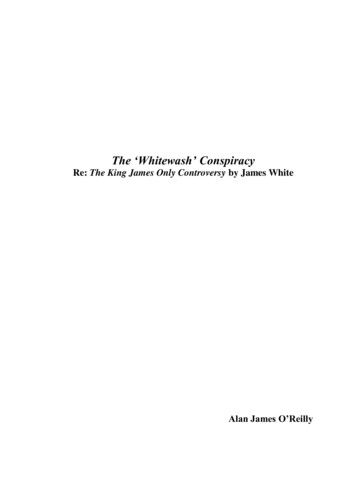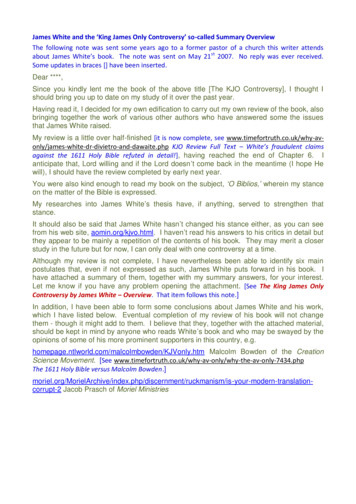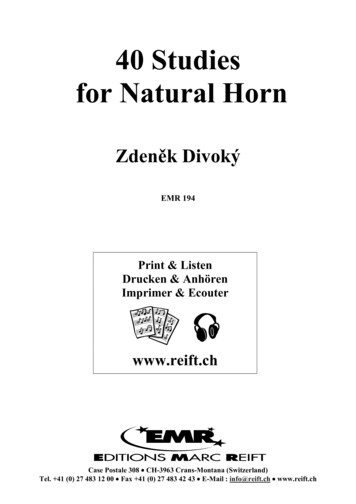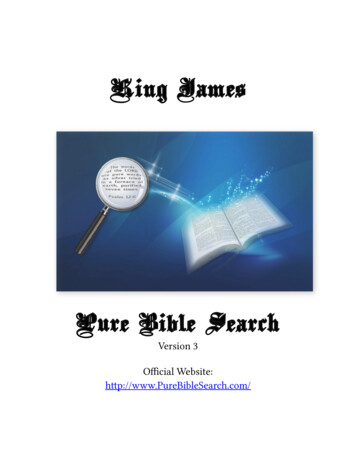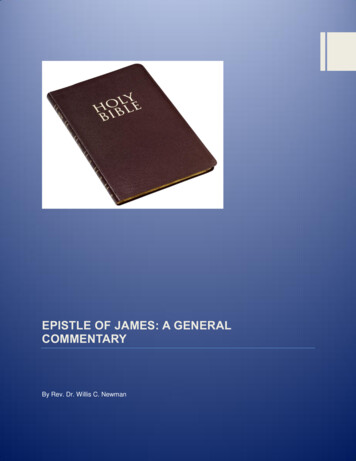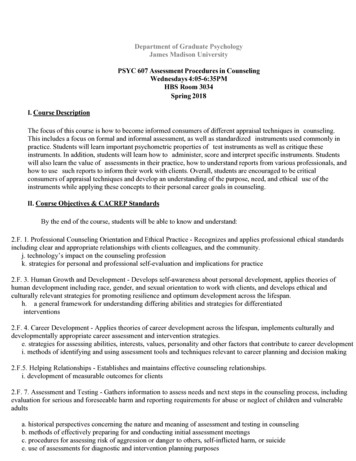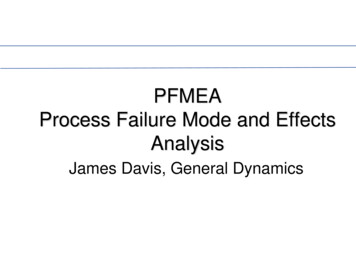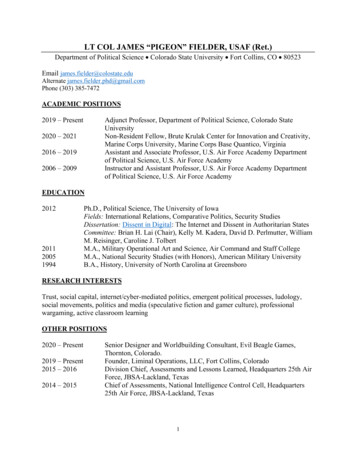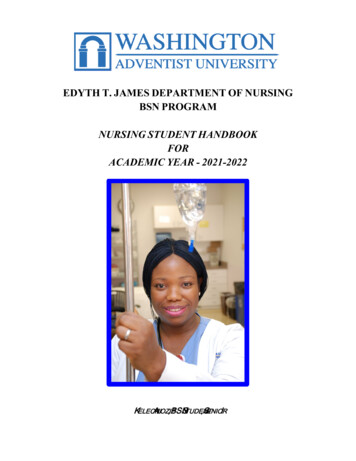
Transcription
EDYTH T. JAMES DEPARTMENT OF NURSINGBSN PROGRAMNURSING STUDENT HANDBOOKFORACADEMIC YEAR - 2021-2022KELECHIALOZIE,BSNSTUDENT,SENIORI
Welcome Letter from the DirectorWelcome to the Department of Nursing at Washington Adventist University. Our nursing program has a rich 112 year history that includes being the first baccalaureate nursing school established in the state of Maryland. TheWashington Missionary College was incorporated in 1904, founded to train young men and women for purposefulliving and Christian Service. In the early years our nursing school was named the Washington Sanitarium TrainingSchool for Missionary Nurses. In 1909, the nursing program started as a three-year hospital-based program, and thenin 1926, the program transitioned to a baccalaureate curriculum. We still provide opportunities for our nursingstudents to serve abroad and our University offers four short-term mission trips to foreign countries each year.You have selected one of the best professions for future employment growth and career satisfaction. According tothe Bureau of Labor and Statistics, employment of registered nurses is projected to grow 12% from 2018 to 2028,much faster than the average for all occupations (U. S. Bureau of Labor Statistics, -nurses.htmGrowth will occur primarily because of technological advancements and an increased emphasis on preventativecare. The large, aging baby-boomer population will demand more healthcare services as they live longer and enjoymore active lives. The Health Resources and Services Administration (HRSA) estimates a nursing shortage of onemillion nurses by 2020. Also, recent changes in the healthcare system have resulted in a need for nurses who willserve at the advanced practice level /nchwa/projections/NCHWA HRSA Nursing Report.pdfWe will work with you towards the goal of completing your nursing degree within our supportive, spiritual,Christian learning community. We have a new, comprehensive curriculum and many success strategies in place thatwill help you progress through our program. Your success is important to us. The faculty, staff, and I look forwardto working with you as we complete this journey together.Sincerely,Tijuana G. GriffinTijuana Griffin, PhD, MSN, RNDirector of Nursing ProgramEdyth T. James Department of NursingWashington Adventist University7600 Flower Avenue.Takoma Park, MD 20912Revised: 08/02/2017; 10/06/2017; 08/2018; 6/2019; 6/2020; 11/2020; 05/2021Page 2
Department of Nursing Faculty MembersLeft to Right: Prof. B. Jitta, Prof. J. Murmu, Dr. H. Wilson, Associate Director,Dr. O. Opanubi, Dr. N. McKenzie, Prof. R. Loukota, Dr. D. Nandipamu (not shown)Center: Dr. T. Griffin, Director of Nursing,Revised: 08/02/2017; 10/06/2017; 08/2018; 6/2019; 6/2020; 11/2020; 05/2021Page 3
Founded in 1907, the Washington Sanitarium was the first hospital inMontgomery County.September 16, 2017Dedication of the Gail and Bruce Boyer Health and Wellness Building.Revised: 08/02/2017; 10/06/2017; 08/2018; 6/2019; 6/2020; 11/2020; 05/2021Page 4
Washington Sanitarium Classroom where our nursing courses were taught in19092021 Laboratory /Classroom in Nursing DepartmentRevised: 08/02/2017; 10/06/2017; 08/2018; 6/2019; 6/2020; 11/2020; 05/2021Page 5
Table of ContentsMission and Program GoalsExpected Student Outcomes for BSN ProgramPhilosophy of Department of NursingModel of Washington Adventist University Nursing Program PhilosophyHuman NeedsDepartment of Nursing EthosFramework for Baccalaureate CurriculumAccreditation of Nursing ProgramsStatement of Student PoliciesTechnology RequirementsCommunicationAffective Domain StandardsAffective Domain Standards of Performance Warning PolicyAcademic Integrity PolicyAttendance PoliciesClassroom Management PoliciesPolicies for Class Projects and Written AssignmentsExamination PoliciesTesting AccommodationsContesting Exam Questions or Exam GradesAcademic Alert and Student Learning Contract ProcessAcademic Grievance ProcedureDemocratic ProcessDrug Dosage Calculation TestingATI Assessment PolicyApproval to Sit for the NCLEX-RN ExaminationPolicies for Progression and ReadmissionEvaluation PoliciesStudent Drug Screening PolicyGrounds for Immediate Dismissal from the Nursing ProgramLeave from the Department of NursingReturning to Program Following Leave of AbsenceSpecial Departmental PoliciesBlood and Body Fluid Exposure Policy and ProcedureClinical Medical RequirementsHospital Clinical ExpectationsLaboratory Attendance PoliciesDisability Support ServicesAcademic Support ServicesStatement on Faith and LearningTechnical Performance StandardsReport of Exposure, Injury, or Incident FormAffective Domain Standards of Performance Warning FormAcademic/Lab/Clinical Alert FormNursing Student Handbook Student Agreement FormStudent Learning ContractRevised: 08/02/2017; 10/06/2017; 08/2018; 6/2019; 6/2020; 11/2020; 828292930303131333334353637383838394142434445Page 6
IntroductionThe Nursing Student Handbook (NSH) is a working document designed to provide information to students in orderto be successful in the nursing program. This handbook is not a substitute for the University’s Student Handbook orthe WAU Academic Bulletin but is in addition to them. The faculty reserves the right to revise this Nursing StudentHandbook as necessary. The information contained in this handbook is subject to revision. Students will be givenwritten notice of any amendments or revisions. Students are expected to read and adhere to policies found in theNursing Student Handbook. Students understand that they are responsible for any updates implemented during theirprogram of study in the Department of Nursing. Students will download and sign the acknowledgement form ofhaving read the 2021-2022 the Nursing Student Handbook. This is an online agreement form located in D2L in eachof their nursing courses which indicates that they have read the current Nursing Student Handbook by the end of thefirst week of class. Completion of this requirement will grant you access to your course materials. Failure to openyour own D2L account and submit a signed acknowledgement form. If students do not complete the online formwithin the first week, they will not be allowed to attend subsequent classes and/or clinical, with potential dismissalfrom the nursing program.MissionMission, Program Goals, Expected Student Outcomes, andPhilosophy of Department of NursingThe primary mission of the Department of Nursing is the immersion of students into a Christo-centric nursingenvironment which fosters the harmonious development of human beings, while instilling the essence of Christiancaring in the nursing role with a focus on service through practice, research, and global leadership.The Department of Nursing aims to achieve its mission by endeavoring to:1.2.3.4.5.6.Contribute to the health care and education of nurses through a Christ-centered and moral-leadership valuesprogramEnhance nursing program excellenceCreate innovative, accessible models of nursing education to meet the needs of an increasingly diversestudent bodyProvide service to the local and global communitySupport faculty professional development, scholarship, and grant productivityPromote collegial spirit and well-being in a healthy work environmentGoal of BSN ProgramThe goal of the BSN program is to prepare generalist nurses who practice within a holistic, caring framework to helpindividuals, families, groups, communities, and populations meet their optimum health potential through humanneed fulfillment.Expected Student Outcomes for BSN ProgramUpon completion of the BSN program, students will be able to:1.2.Integrate theoretical knowledge acquired through the study of the humanities, liberal arts, social sciences,and natural sciences as a foundation to enhance the nursing knowledge and values necessary to deliverprofessional nursing care to clients across the life span within a multicultural society.Demonstrate the ability to provide quality health care within a framework of leadership, qualityimprovement, and patient safety.Revised: 08/02/2017; 10/06/2017; 08/2018; 6/2019; 6/2020; 11/2020; 05/2021Page 7
3.Apply best research evidence, systematic and logical reflective reasoning, and consideration of patientvalues in the promotion of evidence-based nursing practice.4. Demonstrate safe, quality outcomes of care through the competent use of patient care technologies,information management systems, and effective communication techniques.5. Recognize the healthcare, financial, and regulatory policies that influence the practice of professionalnursing.6. Design interventions that improve health promotion, injury prevention, disease risk reduction, in humanbeings and through the population levels.7. Integrate professional communication techniques, collaborative skills, and teamwork as part of dailydelivery of high quality and safe patient care.8. Demonstrate professional standards of nursing, including a commitment to caring, altruism, autonomy,human dignity, integrity, social justice, accountability, learning, and advancement of the profession.9. Deliver quality care to human beings, families, communities and populations across the life span and acrossthe continuum of healthcare environments with a respect for the increased complexity and increased use ofhealthcare resources integral in caring for patients.10. Incorporate the spiritual assessment into the planning and delivery of culturally competent care.Philosophy of Department of NursingThe Edyth T. James Department of Nursing upholds the mission statement of Washington AdventistUniversity, a learning community committed to the Seventh-day Adventist Christian vision of excellenceand service. The nursing faculty provides learning opportunities within a Christian environment thatfosters the harmonious development of students.Human beings were created perfect in the image of God with the power to think, feel, and act. ThroughGod’s plan of salvation, human beings can have eternal life. While human beings no longer live in aperfect state, God’s relationship with them continues to give them dignity, choice, and rights that can beresponsibly directed toward experiencing maximum health through creative fulfillment.Human beings are biophysical, psychosocial and spiritual in nature with similar needs and differentmodes of adaptation. Throughout life, as unique holistic systems, human beings adapt and developthrough the interchange of energy with the environment. Groups of human beings create families,communities, and defined populations. Society, the environment, which consists of multicultural, social,educational, political, and economic conditions affect the survival and health of its members through theutilization and interaction of resources.Health reflects the dynamic interplay of human needs, potential alterations, and actual alterations inhuman need fulfillment. Health can be conceptualized as being on an illness-wellness continuum.Wellness involves the human being’s goal-directed adaptation, growth, development, and realization ofneed fulfillment within a changing multicultural society. Impaired health presents the human being,family, population with an opportunity for adaptation, growth, and the ongoing pursuit of optimumhealth. The subjective experience of human beings influences their definition of health. Movement towardhealth includes awareness, education, and growth.The profession of nursing is a scholarly practice discipline. Through a variety of processes such as caring,spirituality, health promotion, leadership, research, evidence-based practice, the nursing process,facilitation of change, political advocacy, and life-long learning, nursing positively impacts the illnesswellness continuum. The responsibility of society’s health care is shared by nurses, other healthprofessionals, and consumers. Nursing leadership is a communication and relationship process seeking toenvision the needs, strengths and resources of human beings while influencing the individual, family,group, community, and population in the purposeful attainment of mutually defined health goals. ThroughRevised: 08/02/2017; 10/06/2017; 08/2018; 6/2019; 6/2020; 11/2020; 05/2021Page 8
the use of best research evidence, logical reflective reasoning, clinical judgment, and consideration ofpatient values, the professional nurse provides an evidence-based, health-oriented service to society.Model of Washington Adventist University Nursing Program PhilosophyElements of the framework for building the baccalaureate nursing curriculum are based on TheEssentials: Core Competencies for Professional Nursing Education (2021), and the AmericanNurses Association (ANA) Code of Ethics (2015).Revised: 08/02/2017; 10/06/2017; 08/2018; 6/2019; 6/2020; 11/2020; 05/2021Page 9
Washington Adventist UniversityDepartment of Nursing PhilosophyHuman NeedsBiophysiological ygenation1. Perfusion (Cardiac)2. Acid Base Balance3. Ventilation4. DiffusionThe transport and interchange ofoxygen, carbon dioxide andnutrients at the cellular levelRest and Comfort1. Pain2. Stress and Coping3. FatigueThe process of relaxationinvolving decreased humansystem demands, andreflecting the gratificationof human needs, which isnecessary for the realizationof maximum healthFluid & ElectrolytesBalance1. Acid Base Balance2. Metabolism3. IntracranialRegulationThe hemodynamic balance ofbody fluids and electrolytes in theintracellular and extracellularspaces, which are regulated by thekidneys, lungs, skin, GI tract, andendocrine systemSpiritual Integrity1. Grief and loss2. CulturalAn individual’s dynamicpersonal relationship withhigher power reflected inone’s individual belief andvalue system which is thesource of inspiration,meaning, purpose, personalstrength, and hopeEliminationThe extraction of heat andmetabolic by-products from thebody via the respiratory tract,skin, intestinal tract, and kidneysAffiliation1. Love andBelonging2. Social SupportSystems3. Self-ActualizationThe meaningful relatednessof human beings with selfand others that occursthrough discovery,investment and enrichment,resulting in caring,integrated, livingexperiences throughout thelife cycleNutrition1. Energy2. Cellular structureand function3. Failure to Thrive4. MetabolismThe process by which the humansystem uses proteins,carbohydrates, fats, minerals,vitamins and water for energy,maintenance and growth in thefacilitation of human needsfulfillment throughout the lifecycleSexual Integrity1. ReproductiveHealth2. SexualRelationships3. SexualityThe total integrated selfexpression of a humanbeing relating to self, othersthat occurs throughdiscovery, investment andenrichment, resulting in acaring, integrated, livingexperience throughout thelife cycleRevised: 08/02/2017; 10/06/2017; 08/2018; 6/2019; 6/2020; 11/2020; 05/2021Page 10
SleepCyclic physiological process thatalternates with longer periods ofwakefulness. The sleep-wakecycle influences and regulatesphysiological function andbehavioral responses throughoutthe life cycle.Safety1. Infection andInflammation2. Immunity3. Substance abuse4. AbusiveenvironmentsA state of well-beinginvolving the perception ofan individual, and reflectionof freedom fromthreats/harm to the humanneeds of that individualwithin their environmentMobilityThe initiation of movement whichrequires energy to perform orcomplete activities of daily livingacross the lifespan.Self-Esteem1. Developmentalmilestones acrossthe lifespan2. Healthpromotion/healthbeliefs3. Behaviors4. Teaching andlearningThe fluctuation appraisal ofself and others, that isreflected in one’s feelings ofacceptance, affection,approval, worth, andcompetenceSensation andCognition1. Mood and affect2. Tissue integrityThe reception, meaningfulorganization and interpretation ofvisual, auditory, olfactory, tactile,gustatory, kinesthetic, and visceralstimuliReferencesHenderson, V. (1966). The nature of nursing. New York, NY: Macmillan.Hinkle, J., Cheever, K. (2018). Brunner and Suddarth’s textbook of medical-surgical nursing (10th ed.). Baltimore,MD: Lippincott Williams & Wilkins.Ignatavicius, D. & Workman, L. (2021). Medical-Surgical Nursing: Concepts for Interprofessional CollaborativeCare, (10th ed.). Atlanta, GA: ElsevierPotter, P., & Perry, A.G., Stockert, P., Hall, A. (2021). Fundamentals of nursing (10th ed.). Atlanta, GA: Elsevier.Yura, H, & Walsh, M. (1983). The nursing process, assessing, planning, implementing, evaluating. Norwalk, CT:Appleton Century Crofts.Revised: 08/02/2017; 10/06/2017; 08/2018; 6/2019; 6/2020; 11/2020; 05/2021Page 11
Washington Adventist University and Department of Nursing Mission and EthosWashington Adventist University MissionEdyth T. James Department of NursingMission StatementWashington Adventist University is a learningcommunity committed to the Seventh-day AdventistChristian vision of excellence and service. Thiscosmopolitan institution challenges students to seize theopportunities for learning in the nation’s capital in orderto become moral leaders in communities throughout theworld.The primary mission of the Department ofNursing is the immersion of students into aChristo-centric nursing environment, whichfosters the harmonious development of humanbeings while instilling the essence of Christiancaring in the nursing role with a focus on servicethrough practice, research, and global leadership.Washington Adventist UniversityEthosFaith:We value faith in God, and celebrate the goodness ofcreation, the dignity of diverse people, and the possibilityof human transformation. Through worship and sharedlife, we uphold spiritual integrity and help one another toachieve it.Department of NursingEthosMind:We value the enhancement of the mind throughenthusiasm, excellence, and honesty in learning. In bothstudy and conversation, we honor the consideration ofideas and the increase of understanding.Respect:We value safety, respect, and courtesy as every person’sneeds and rights. To assist one another in learning, weattend, in particular, to making our environmenthospitable to study.Service:We value generosity in both attitude and practice, andconsider higher education to be both training and anopportunity for service.Beauty:We value beauty and order—in the buildings, on theground, in ourselves. We take responsibility for thelook, the sound, and the feel of our campus.Human beings were created perfect in the imageof God but no longer live in a perfect state.Nursing, through God’s relationship with humanbeings, seeks to direct them toward theexperience of maximum health.Learning enhances the mind through the activeparticipation of the learner and educator;occurring in the affective, cognitive, andpsychomotor domains. The educator facilitateslearning by acting as a role model and a resourceperson who provides structured and serendipitouslearning experiences.Throughout life, human beings have the right toexpect appropriate affirming and respectfulinteraction within a safe environment that valuesdiversity.The profession of nursing is a scholarly practicediscipline that provides an opportunity forcreative, health-oriented service to society.Maintaining beauty and order within the nursing(patient care) environment represents thecommitment of nursing to aesthetic, empirical,and personal foundations of the profession.Health:We value the health of body, mind, and soul, andencourage one another to eat, rest, and exercise formaximum benefit to our entire being.Health is a subjective experience defined by theindividual. It reflects the holistic and dynamicinterplay of human needs across the life span.Growth:We value both honesty and determination with respect tothese ideals. We acknowledge our need and capacity,under God, for continuous growth toward theirrealization.Growth is a fundamental principle of life andrepresents the capacity of mankind to fullydevelop the mental, physical, and spiritualdimensions of self, guided by biblical precepts.Revised: 08/02/2017; 10/06/2017; 08/2018; 6/2019; 6/2020; 11/2020; 05/2021Page 12
Framework for Baccalaureate CurriculumThe elements and framework for building the baccalaureate nursing curriculum is based on The Essentials: CoreCompetencies for Professional Nursing Education (2021), the 2019 NCLEX-RN Test Plan, the Quality and SafetyEducation for Nurses (QSEN) competencies (2012), and the American Nurses Association (ANA) Code of Ethics(2015).The Essentials: Domains for NursingDomain 1: Knowledge for Nursing PracticeDomain 2: Person-Centered CareDomain 3: Population HealthDomain 4: Scholarship for the Nursing DisciplineDomain 5: Quality and SafetyDomain 6: Interprofessional PartnershipsDomain 7: Systems-Based PracticeDomain 8: Informatics and Healthcare TechnologiesDomain 9: ProfessionalismDomain 10: Personal, Professional, and Leadership DevelopmentReference: American Association of Colleges of Nursing. The Essentials: Core Competencies for ProfessionalNursing Education (2021). Retrieved cNursing/pdf/Essentials-2021.pdfThe Content of the NCLEX-RN Test Plan1.2.3.4.Safe and Effective Care Managementa. Management of Careb. Safety and Infection ControlHealth Promotion and MaintenancePsychosocial IntegrityPhysiological Integritya. Basic care and Comfortb. Pharmacological and Parenteral Therapiesc. Reduction of Risk Potentiald. Physiological AdaptationReference: National Council of State Boards of Nursing. (2019). NCLEX-RN Examination TestPlan. Retrievedfrom https://www.ncsbn.org/2019 RN TestPlan-English.pdfQuality and Safety Education for Nurses (QSEN) CompetenciesFrom 2005 to 2012, nursing leaders responded to the Institute of Medicine’s call to improve the quality of healthcareby working on the QSEN project (2012). This project was funded by the Robert Wood Johnson Foundation andconsisted of the development of quality and safety competencies. These competencies serve as a resource forfaculty, assisting them in integrating quality and safety content into nursing curriculums. The QSEN competenciesare:1. Patient-Centered Care2. Teamwork & Collaboration3. Evidence- Based PracticeRevised: 08/02/2017; 10/06/2017; 08/2018; 6/2019; 6/2020; 11/2020; 05/2021Page 13
4. Quality Improvement5. Safety6. InformaticsReference: Hunt, D. (2012). QSEN competencies: A bridge to practice, 10(5), 1-3. Retrieved asy/Fulltext/2012/09000/QSEN competencies A bridge to practice.1.aspxANA Code of Ethics1.The nurse practices with compassion and respect for the inherent dignity, worth, and unique attributesof every person.2.The nurse’s primary commitment is to the patient, whether an individual, family, group, community,or population.3.The nurse promotes, advocates for, and protects the rights, health, and safety of the patient.4.The nurse has authority, accountability, and responsibility for nursing practice; makes decisions; andtakes action consistent with the obligation to promote health and to provide optimal care.5.The nurse owes the same duties to self as to others, including the responsibility to promote health andsafety, reserve wholeness of character and integrity, maintain competence, and continue personal andprofessional growth.6.The nurse, through individual and collective effort, establishes, maintains, and improves the ethicalenvironment of the work setting and conditions of employment that are conducive to safe, qualityhealth care.7.The nurse, in all roles and settings, advances the profession through research and scholarly inquiry,professional standards development, and the generation of both nursing and health policy.8.The nurse collaborates with other health professionals and the public to protect human rights, promotehealth diplomacy, and reduce health disparities.The profession of nursing, collectively through its professional organizations, must articulate nursing values,maintain the integrity of the profession, and integrate the principle of social justice into nursing and healthpolicy.To access the ANA Code of Ethics with Interpretive Statements:Reference: American Nurses Association (2015). Code of Ethics for Nurses with Interpretive Statements.Retrieved from view-only/The Washington Adventist University Department of Nursing aims to achieve its missionthrough pursuit of the following goals:Revised: 08/02/2017; 10/06/2017; 08/2018; 6/2019; 6/2020; 11/2020; 05/2021Page 14
Department of Nursing GoalsChrist-CenteredContribute to the health care and education of nursesthrough a Christ-centered and moral-leadership valuesprogramProgram ExcellenceEnhance nursing program excellenceInnovation and AccessibilityCreate innovative, accessible models of nursingeducation to meet the needs of an increasingly diversestudent bodyCommunity ServiceProvide service to the local and global communityFaculty DevelopmentSupport faculty professional development, scholarship,and grant productivityHealthy Work EnvironmentPromote collegial spirit and well-being in a healthywork environmentStrategic Themes and Imperatives ofUniversityEncourage faith development that is deliberate,personal, and critically awareImplement an institutional assessment plan and metricsCreate a distinctive and distinguished learning cultureEmbrace and explore the opportunities of the Nation’scapitalExpand and strengthen financial resourcesTransform Governance and physical campusDeeply engage and value peopleAccreditation and Approval of Nursing ProgramsThe baccalaureate degree in nursing and master’s degree in nursing programs at Washington AdventistUniversity are accredited by the Commission on Collegiate Nursing shington Adventist University’s nursing programs are approved by the Maryland Board of Nursing(http://mbon.maryland.gov) and the Maryland Higher Education Commission (www.msche.org).The University is accredited by the Middle States Commission on Higher Education (www.msche.org) and theAccrediting Association of Seventh-day Adventist Schools, Colleges, and n.org).Revised: 08/02/2017; 10/06/2017; 08/2018; 6/2019; 6/2020; 11/2020; 05/2021Page 15
Statement of Student PoliciesProfessional Integrity, Behavior Policy, and Affective Domain StandardsOverviewConsistent with the mission of the Department of Nursing is the expectation that students will exhibit the higheststandards of professional behavior. These expectations are inclusive of professional behaviors defined throughoutthis document, and in particular within the Professionalism and Affective Domain Competencies. Each student isrequired to conduct himself/herself with honesty, integrity, and in a professional manner while in the classroom,university buildings, laboratory, clinical or practicum settings.Technology Requirements1.All students are expected to use their wau.edu email address for all communications with faculty andadministrators within the Department of Nursing. The Department of Nursing faculty, administration, andstaff will only communicate with students using the wau.edu email.2.Students are expected to check their wau.edu email accounts daily and respond as requested. They areresponsible for all communications sent to the wau.edu email account.3.In addition, all students are expected to daily check Desire to Learn (D2L) for announcements and updates.Use Turnitin.com on all written assignments. Students will utilize the Microsoft Word for all typedassignments and use PowerPoint as needed. Also, students should access and use Grammarly throughD2L.Students are expected to be computer literate and able to access information using various websites andemail. Students must be professional with social media and not engage in any activity that will representviolations in HIPPA or FERPA policies.4.Proper Protocols for Computer Lab1.2.3.The school computers are not to be used for personal activities such as surfing the internet, accessing anysocial media, accessing personal email and any other activity that will cause the computers to becomecorrupt.Students are not allowed to use any external drives, i.e. thumb drives, on any computers in the nursingdepartment. Students may send coursework to the WAU email/ D2L or some other Internet storage.Misuse of computers will be considered a serious violation of the affective domain policy.Main OfficeCommunication1.The Department of Nursing administrative suite is located in Room 205 of the Health Sciences Building.2.In addition to providing support for the daily operation of the Department, the staff of the Department ofNursing serves as a resource of information for students, faculty, other WAU offices, and members of thegreater community. Students are welcome to visit the office during regular operating hours to conductbusiness, submit assignments and other papers, or to make appointments to meet with nursingadministrators.Revised: 08/02/2017; 10/06/2017; 08/2018; 6/2019; 6/2020; 11/2020; 05/2021Page 16
Common CourtesyInteraction with office personnel must be conducted in a professional manner. As part of a professional office, eachstaff member is committed to delivering quality service.The reception area is particularly designed to welcome students, faculty and other members of the community. Allvisitors to the Department of Nursing offices should enter the reception area first, to be assisted by the receptionist.In the interest of courtesy and privacy, students are not permitted to enter directly into any faculty or administrativeoffice without first being invited to do so.Chain of CommandIf students have a concern or complaint to discuss, it is important to follow the chain of command.
Nursing Student Handbook. Students understand that they are responsible for any updates implemented during their program of study in the Department of Nursing. Students will download and sign the acknowledgement form of having read the 2021-2022 the Nursing Student Handbook
